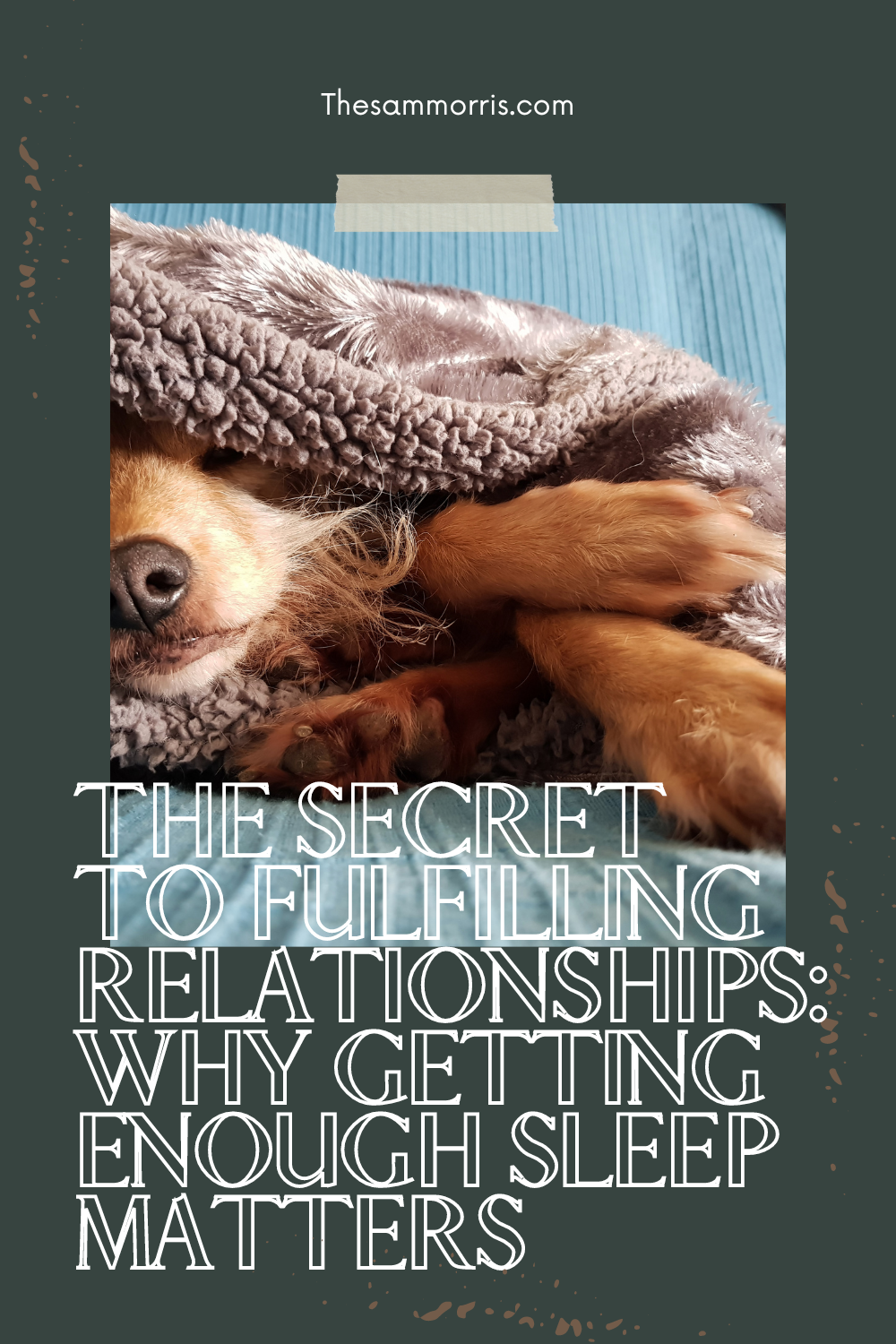The Secret to Fulfilling Relationships: Why Getting Enough Sleep Matters
Jun 03, 2024
In our fast-paced world, sleep often takes a backseat to the demands of work, family, and social commitments. Yet, research consistently shows that getting enough sleep is crucial for our overall well-being. One area that is affected by our sleep habits is our relationships. Whether it’s with a partner, family members, friends or even trying to date, sleep plays a significant role in how we connect and interact with others. Let’s dive into why getting enough sleep is essential for building and maintaining fulfilling relationships.
The Science Behind Sleep and Relationships
Emotional Regulation and Mood Stability
Sleep is fundamental for emotional regulation. Studies have shown that sleep deprivation can lead to increased irritability, mood swings, and a decreased ability to manage stress. According to a study published in the journal Sleep, individuals who do not get enough sleep are more likely to experience negative moods and have a harder time handling stressful situations . This can lead to more conflicts and misunderstandings in relationships, as we are less equipped to deal with the inevitable ups and downs that come with human interaction.
If you are in a relationship, this means you will struggle to have constructive conversations when there is conflict. When you are trying to date, this means if you face negativity, such as being rejected, you may struggle to cope with this more than if you had had enough sleep. You may say "this isn't worth it." Or something similar.
Communication and Conflict Resolution
Effective communication is the backbone of any strong relationship. When we are well-rested, we are better able to articulate our thoughts, listen, and engage in meaningful conversations.
A study published in the Journal of Family Psychology found that couples who experienced poor sleep were more likely to engage in negative communication patterns and had difficulty resolving conflicts . Ensuring both partners get enough sleep can foster a more harmonious and supportive relationship dynamic.
What this means if you are dating, is, if you don't have the foundations for a relationship because you aren't good at conflict resolution, because you haven't had enough sleep, then maybe this is something you should work on prior to trying to date.

Empathy and Social Perception
Empathy - the ability to understand and share the feelings of others, is a cornerstone of healthy relationships. And research from the University of California, Berkeley, suggests that sleep deprivation affects our ability to read and respond to social cues.
Without sufficient sleep, our capacity to empathise diminishes, making it harder to connect with others. This can lead to feelings of disconnection and isolation, even in close relationships.
The Physical Connection
Intimacy and Sexual Health
Sleep also impacts our physical health and, by extension, our intimate relationships. Adequate sleep is linked to better hormonal balance, which plays a crucial role in sexual health and desire. The National Sleep Foundation highlights that sleep-deprived individuals often report lower libido and less interest in physical intimacy . Prioritising sleep can therefore enhance the physical aspect of relationships, contributing to a more satisfying and fulfilling connection.
Energy and Engagement
When we are well-rested, we have more energy to invest in our relationships, whether this be intimate, family or friendships. This means you are more present, attentive, and engaged with your loved ones.
If you are dating, it is more important than ever to be present on the date and I don't just mean being there in person. You could be missing out on someone amazing, simply because you can't concentrate enough to get to know someone, because of lack of sleep.

Practical Tips for Better Sleep and Stronger Relationships
- Establish a Sleep Routine: Going to bed and waking up at the same time every day can regulate your body’s internal clock and improve sleep quality - set an alarm in the evening for bedtime, stick to it.
- Create a Sleep-Friendly Environment: Make your bedroom a sanctuary for sleep. Keep it cool, dark, and quiet, and invest in a comfortable mattress and pillows. Maybe get some nice pillow spray.
- Limit Screen Time: Reduce exposure to screens before bedtime, as the blue light emitted by phones, tablets, and computers can interfere with your sleep cycle. Restrict your screen time using your phone settings, make all apps except calls (for emergencies) unavailable after a certain time and then read a book.
- Manage Stress: Practice relaxation techniques such as meditation, deep breathing, or yoga to reduce stress and promote better sleep.
- Communicate About Sleep Needs: Talk to someone about your sleep needs and come up with a plan, this keeps you accountable. Don't have anyone to do this with? Get a watch that tracks your sleep and keep looking at it.
Why getting enough sleep matters
Sleep is not just a luxury; it’s a necessity for our physical, emotional and relationships health. By prioritising quality sleep, we give ourselves the tools needed to nurture and maintain fulfilling relationships. So next time you’re tempted to stay up late watching netflix or browsing social media, remember that getting enough sleep is an investment in your relationships and your overall well-being.
References:
- Anderson, C., & Platten, C. R. (2011). Sleep deprivation lowers inhibition and enhances impulsivity to negative stimuli. Sleep, 34(10), 1313-1319.
- Simon, E. B., Oren, N., Sharon, H., & Nir, Y. (2017). Losing neutrality: The neural basis of impaired emotional control without sleep. Journal of Neuroscience, 37(23), 6087-6096.
- Gordon, A. M., & Chen, S. (2014). The role of sleep in interpersonal conflict: Do sleepless nights mean worse fights? Journal of Family Psychology, 28(2), 234-244.
- National Sleep Foundation. (2010). How sleep affects relationships. Retrieved from sleepfoundation.org
Want more?
See my post on Common dating mistakes (thesammorris.com)

